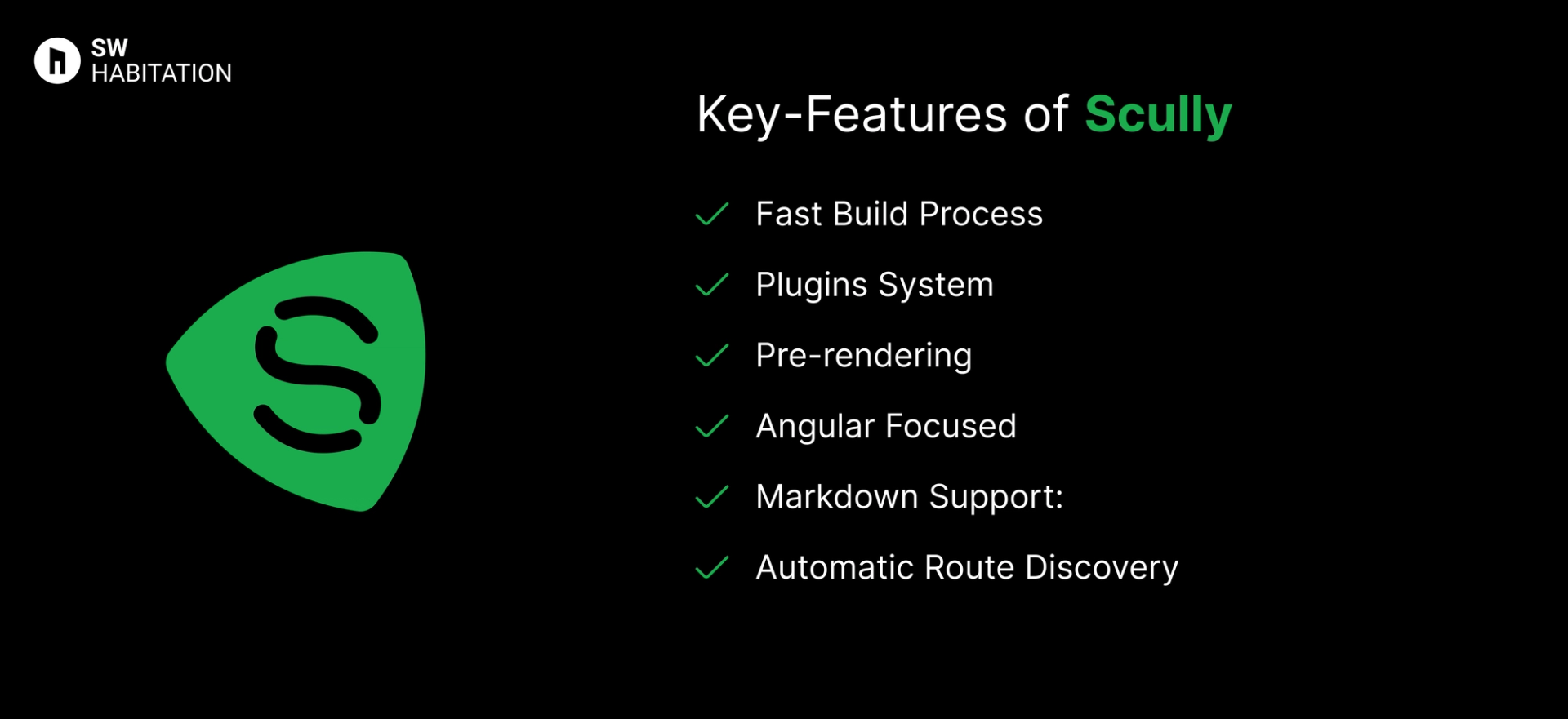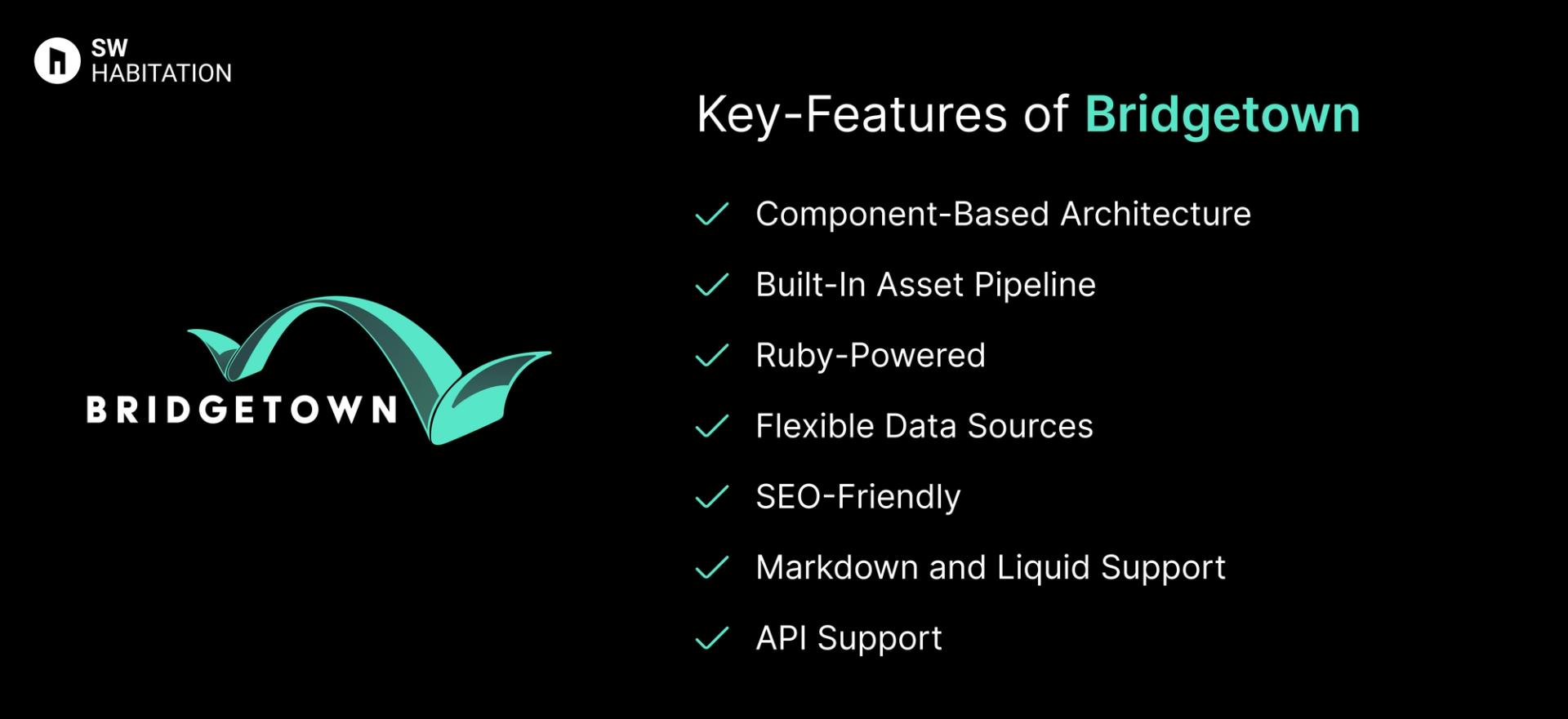Scully vs. Bridgetown

Scully

Bridgetown
Have you ever been to a website that loads super fast? Chances are it uses an SSG (Static Site Generator). It’s a tool that builds your site ahead of time, so when someone visits, they get the page instantly. No waiting around for things to load it’s just there.
What is Scully?
Scully is the first static site generator for Angular. It takes your Angular app, crawls the routes, pre-renders each page, and exports static HTML files that can be served directly.
This results in faster load times and better SEO because search engines can read your content without waiting for JavaScript to execute.
Key Features of Scully


- Fast Build Process: Quickly converts your Angular app into a static site.
- Plugins System: Extend functionality with custom plugins for tasks like image optimization or content transformations.
- Pre-rendering: Generates static HTML for each route, improving performance and SEO.
- Angular Focused: Built specifically for Angular projects, making integration smooth.
- Markdown Support: Easily create content-driven sites using markdown files.
- Automatic Route Discovery: No need to manually define routes — Scully finds them automatically.
Advantages of Scully
- SEO-Friendly: Static content is easily indexed by search engines.
- Boosted Performance: Pre-renders pages for faster load times.
- Extendable: Customize builds with plugins tailored to your needs.
- Simple Setup: No complicated configurations —just install and go.
- Perfect for Angular: Seamlessly integrates with existing Angular projects.
Disadvantages of Scully
- Smaller Community: Compared to React or Vue SSGs, Scully has a smaller community and fewer resources.
- Learning Curve: Requires understanding of Angular and Scully’s pre-rendering process.
- Angular Only: Not suitable for projects outside the Angular ecosystem.
What is Bridgetown ?
Bridgetown is a static site generator built with Ruby.
It is designed to help developers create fast, modern websites with ease. It’s often seen as the spiritual successor to jekyll, with a fresh take on static site generation. Bridgetown combines the power of Ruby with a modern development workflow, supporting things like webpack, dynamic content with APIs, and flexible templating options.
Key Features of Bridgetown


- Component-Based Architecture: It supports reusable components for cleaner code.
- Built-In Asset Pipeline: It integrates with webpack for managing assets like CSS and JavaScript.
- Ruby-Powered: It leverages the simplicity and power of Ruby.
- Flexible Data Sources: It pull content from YAML, JSON, CSV, or external APIs.
- SEO-Friendly: It generates clean, semantic HTML with built-in SEO optimisations.
- Markdown and Liquid Support: It writes content in Markdown and use liquid for templating.
- API Support: It fetches dynamic content from APIs while keeping the site static.
Advantages of Bridgetown
- Extensible: Custom plugins and extensions for advanced use cases.
- Fast and Lightweight: Generates static HTML for quick load times.
- Great for Ruby Developers: Familiar tooling and language.
- Easy Content Management: Ideal for blogs and documentation sites.
- Powerful Templating: Supports Liquid, ERB, and other templating engines.
Disadvantages of Bridgetown
- Ruby Knowledge Required: Best suited for Ruby developers.
- Smaller Community: Compared to older SSGs like Jekyll, the community is still growing.
- More Setup: Requires setting up a Ruby environment, which may be unfamiliar to non-Ruby developers.
Comparison Between Scully vs Bridgetown
Use Cases of Scully
- Portfolios: Highlight your projects with a sleek, fast portfolio.
- Personal Blogs: Markdown support makes blogging simple and fast.
- Documentation Sites: Pre-rendered content ensures fast, accessible documentation.
- Company Websites: Improved SEO and performance help showcase your business.
Use Cases of Bridgetown
- Content-Driven Sites: Great for blogs, documentation sites, and portfolios.
- Ruby Lovers: If Ruby is your jam, you’ll feel right at home.
- Small Projects with Big Potential: Clean structure and fast build times make it a good fit for smaller projects that may grow.
- Custom Workflows: Offers flexibility in handling assets and external data sources.
Other Resources
Conclusion
Static Site Generators are a big game changer if you’re looking to build a website that’s fast, secure, and easy to maintain. Whether you’re launching a personal blog, portfolio, or a business website, they give you the freedom to focus on what really matters, your content and your users without all the extra complexity.
The best part? You’re not locked into one way of doing things. You can choose the tools and tech you’re most comfortable with, and scale things up as your site grows. From lightning-fast load times to better SEO and easy hosting, SSGs make the whole process smoother.
At the end of the day, it comes down to what fits your workflow and goals best. Pick the one that feels right to your requirements, and you’ll be well on your way to creating a beautiful, high-performing website that you’re proud of 🙌
Frequently asked questions
Is Scully easy to integrate with Angular?
Yes, integrating Scully with Angular is simple with just a few commands. It works alongside Angular’s powerful features but optimizes it for static site generation.
Does Scully handle SEO?
Yes, Scully automatically generates meta tags, sitemaps, and other SEO-friendly elements for better search engine optimization.
What’s the main benefit of using Scully with Angular?
Scully gives Angular apps static site generation (SSG) capabilities. It helps you pre-render pages at build time, improving page load speeds and search engine visibility.
Can I use Scully with any Angular project?
Yes, If you're already using Angular, you can add Scully to your project to generate a static version of it for better SEO and performance.
Is Bridgetown actively maintained?
Yes, Bridgetown has an active community, and it’s regularly updated with new features and bug fixes. You’ll always have access to the latest updates.
Is Bridgetown content-friendly?
Yes, It works well with Markdown, custom components, and layouts, so you can easily create structured content.
Is Bridgetown only for Ruby devs?
Yes, Bridgetown is built for Ruby developers and works well with the Ruby on Rails ecosystem. If you’re familiar with Ruby, you’ll love its seamless integration.
Is Bridgetown a good Jekyll alternative?
Bridgetown is a modern alternative to Jekyll, with a more flexible architecture, faster build times, and improved plugin support.
